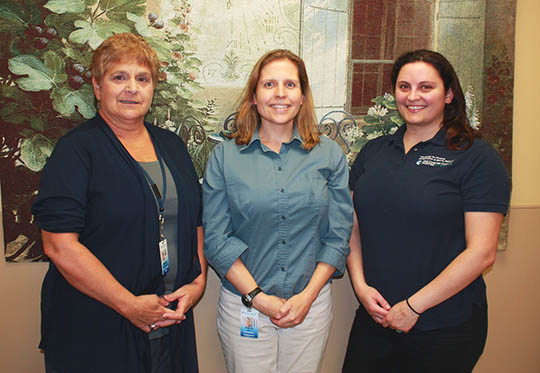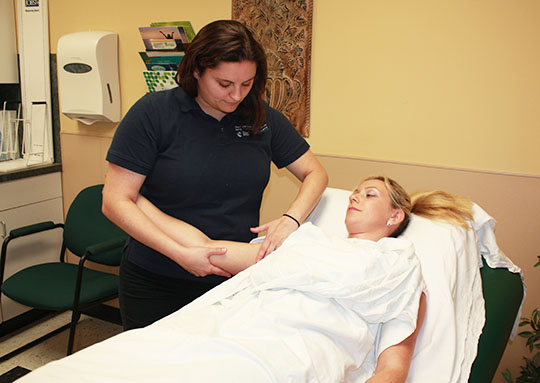by Beth Eburn
A diagnosis of breast cancer and the rigors of treating the disease can bring some expected and unexpected challenges into a person's life. For some people, a medical condition called lymphedema may be one of those challenges.
Lymphedema is an abnormal build-up of fluid in the body that can cause swelling in the limbs, chest and trunk area. The condition is often a direct result of surgery involving the removal of lymph nodes and/or radiation affecting lymph nodes. Both are common in treating breast cancer.
While not life-threatening, lymphedema can be uncomfortable, taxing and painful. It can reduce overall quality of life by affecting mobility, limiting normal functioning and impeding the immune system. It can also cause temporary disfigurement that impacts body image and self-esteem.
There is no cure for this ailment, but the good news is that it can be managed. With early detection and proper treatment, lymphedema can be controlled allowing people dealing with the condition to live normally and enjoy a high quality of life.
The Lymphedema Treatment Program at Chester County Hospital, provided by the Department of Physical Therapy, Rehabilitation and Sports Medicine, offers a comprehensive approach to treatment and management. The program’s specially trained therapists are skilled in effective techniques available to reduce the build-up of lymphatic fluid and address the most difficult effects of the condition. The team has extensive experience treating breast cancer patients through every phase of lymphedema care and closely collaborate with all members of a patient’s health care team including their physicians, nurse navigators, genetic counselors and social workers. Since the needs of a breast cancer patient can be complex, these specialists can also assist patients with issues regarding range of motion, strength and fatigue through physical therapy.

From left to right: Lead lymphedema therapist Marion Cella-Ries, PT, CLT;
Carrie Leese, DPT, CLT; and Gina Wells, DPT, CLT.
"We are proud of the high level of expertise of our staff. We have therapists at three different office locations who have all gone through the most advanced training in the treatment of lymphedema, including 135 hours of instruction in cutting-edge, hands-on techniques," said Marion Cella-Ries, PT, CLT, the lead therapist of Chester County Hospital's Lymphedema Treatment Program. "Every patient we meet is unique. Our therapists develop customized care plans specific to the needs of each patient that are focused on treatment and prevention."
Since each plan is individualized, the course and length of treatment is different for every person. A patient’s care plan is determined by staff based upon an initial evaluation and various factors including the amount of swelling present. Treatment may last from four to eight weeks and maintenance of the condition continues into the future.
According to Cella-Ries, most care plans include Complete Decongestive Therapy (CDT), a non-invasive approach that is considered the "gold standard" of lymphedema treatment. CDT includes an initial phase of therapy during which therapists use a hands-on technique called Manual Lymphatic Drainage to eliminate excess lymph fluid, reduce swelling and ease discomfort. CDT also includes the use of compression bandaging to decrease swelling; exercises to improve circulation, flexibility, and strength; and a self-management program that provides information and teaches skills for ongoing lymphedema management.
"People are not that familiar with how the lymphatic system actually works to keep bodily fluid levels in balance or what happens when it does not work properly. Most have never heard of lymphedema until it affects them personally,"; Cella-Ries explained. "Unfortunately, the build-up of lymph fluid can be slow and insidious. A breast cancer patient may develop the condition within a few days following the end of treatment or it may show up years after treatment has finished."

Lymphedema Therapist, Gina Wells, DPT, CLT, demonstrates
a technique called Manual Lymphatic Drainage.
Early diagnosis and management are vital when it comes to effectively dealing with the challenges of lymphedema. Fortunately, people who live in Chester County can find all the care they need to treat with the condition close to home. The Lymphedema Treatment Program is offered at three of Chester County Hospital’s satellite locations: Fern Hill Medical Campus in West Chester, Penn Medicine Exton and Penn Medicine Southern Chester County. Services do require a prescription and referral from a physician.